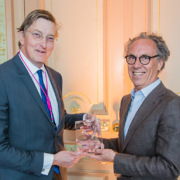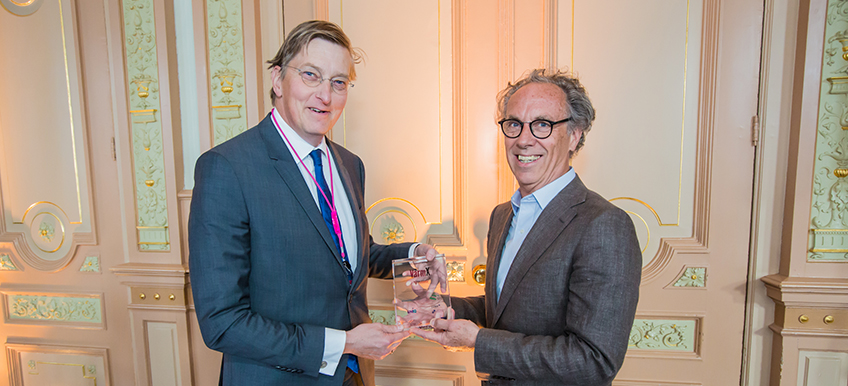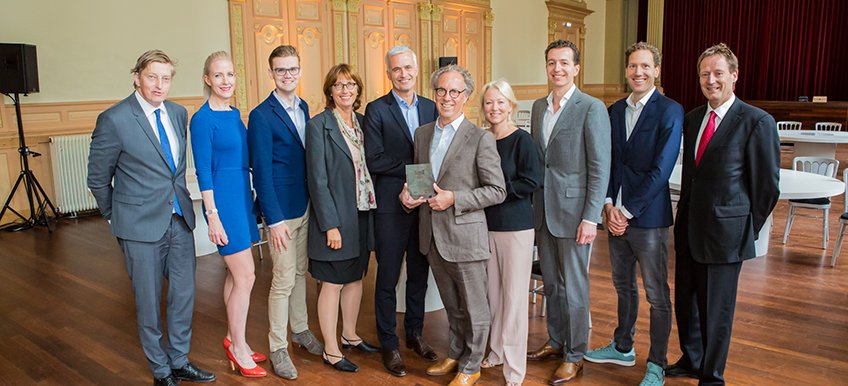In Rotterdam, Leiden en Delft almost 60 representatives took part in an intensive programme with the ambition to learn, connect and cooperate. Their meetings covered innovations in medtech healthcare, biomedical engineering, automated transport and sustainable mobility.
Life Sciences & Health programme
Rotterdam
At the Life Sciences & Health hub in the Rotterdam Science Tower, the delegation was introduced to the West Holland Life Sciences and Health cluster and discovered why more and more (international) medtech companies choose Rotterdam as their European base.
How companies and governments work together on the medicine of the future within the Medical Delta scientific programmes, was explained by Prof. Dr. Ir. Ton van der Steen, head of Biomedical Engineering at institutes Medical Center and chairman of Medical Delta. Medical Delta is a network of life sciences, health and technology organizations driven by the cooperation between Leiden University, Erasmus University, Technical University of Delft, Erasmus Medical Center and Leiden University Medical Center.
From a regional perspective the topic moved into healthcare innovations happening in and around the Erasmus Medical Center. Nathalie Popken from the Erasmus MC Technology Transfer Office gave examples of different healthcare innovations that often emerge from the working floor of the hospital. One example is the robotic bedwash-central that reduces the amount of water needed to clean a hospital bed from 30 to 6 liters and greatly reduces the amount of chemicals.
3 Rotterdam companies presented their innovations to the delegation;
- Rotterdam Science Tower residents Omnigen, a bioinformatics company doing biomarker discovery and DNA testing for business and consumers;
- SurGuide , a medical device company aiming at improving cancer care by supporting oncologic surgeons in their strife for complete tumor removal.
- Australian medtech productdesign company IDE recently started their European office in Rotterdam and explained how they develop new healthcare innovations and start-ups together to build better futures for patients.
Delft
In Delft, the group visited the world-renowned business incubator YES!Delft, where they met with representatives from Delft University of Technology, YES!Delft and several companies. During a lunch-and-learn session they learned about the TU Delft Health Initiative, RoboValley, and the work performed by the Biomechanical Engineering group of the faculty 3ME. Lastly, the group had a tour in the incubator itself, and learned about how the Delft School of Incubation is brought into practice.
Leiden
After the tour in Rotterdam and Delft the Four Motors delegation visited the Leiden Bio Science Park. Pieter Reitsma, Founder of VarmX, and Niall Hodgins, CEO of SeraNovo, presented their exciting startup companies. The delegation toured the Biopartner flexible office and lab facilities and the day ended with networking drinks before heading to the airport.
Mobility programme
The Mobility delegation started in the morning at CIC in Rotterdam. Quirijn Oudshoorn (Municipality of Rotterdam) informed the delegation about the status and future plans of the city of Rotterdam with regard to electric mobility. The city is not only looking for more, but also better and smarter solutions and is setting up pilots to test new solutions such as wireless charging and plaza’s with multiple chargepoints. In order to work with startups that have good solutions improve mobility in the city, Rotterdam has set up the Rotterdam Mobility Lab. This platform provides startups with a good solution for urban mobilty a chance to test. Niki Sie of Juuve, one of the alumni of the program informed the delegation of the shared mobility solution the company provides. Their solution provides easy access to users for make use of a car without owning one, thereby also reducing the amount of vehicles in a city.
Next stop: the Park Shuttle at Rivium Business park. Here they have been making use of autonomous shuttles for public transport for 20 years. This was the first, and until now, the only place to do this in the world. The project is aiming to expand the area it covers and the plans for expansion were shared with the delegation. A rare view into the control room was also provided in order give the delegation a complete insight into the operation of the shuttle.
Lunch was enjoyed at Connekt in Delft. Tom van Dam of this network organization for smart and sustainable mobility gave an explanation on their work. With their extensive member base, Connekt is able to provide valuable contacts in the Dutch market for the Four Motors delegation. As Connekt also works at providing the Dutch mobility sector a platform in other markets via the Smart Mobility Embassy (SME), Jose Oudijk of Connekt explained the role of SME. After lunch the delegation moved to the Green Village at the TU Delft. At the Green Village the Researchlab Autonomous Driving Delft (RADD) performs research, but is also able to provide a testing area for autonomous transport. Rissan Slaghek explained what the focus is of RADD and the research topics they are working on. As the region is keen to implement these solutions, Britt Doornekamp of MRDH (Metropolitan Region Rotterdam The Hague) explained how the regional authorities are backing these initiatives through policy and with financial means.
























